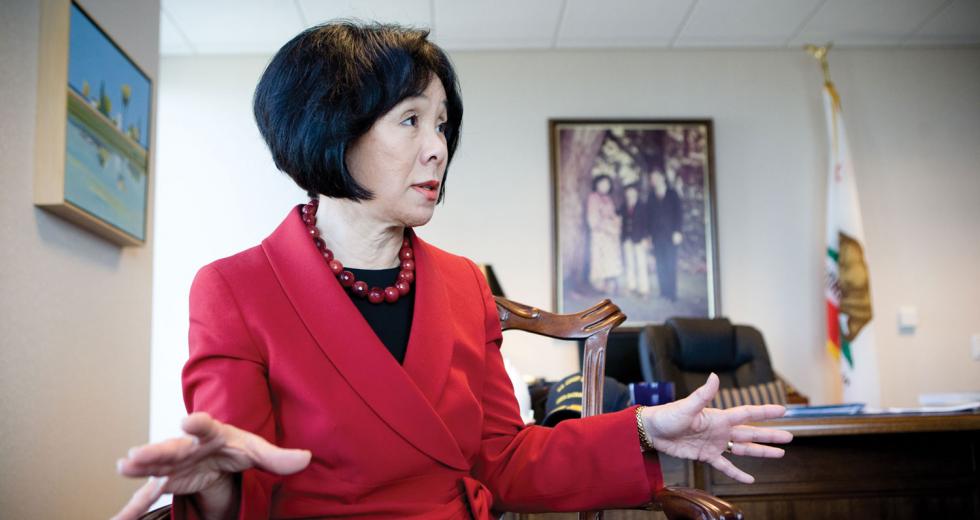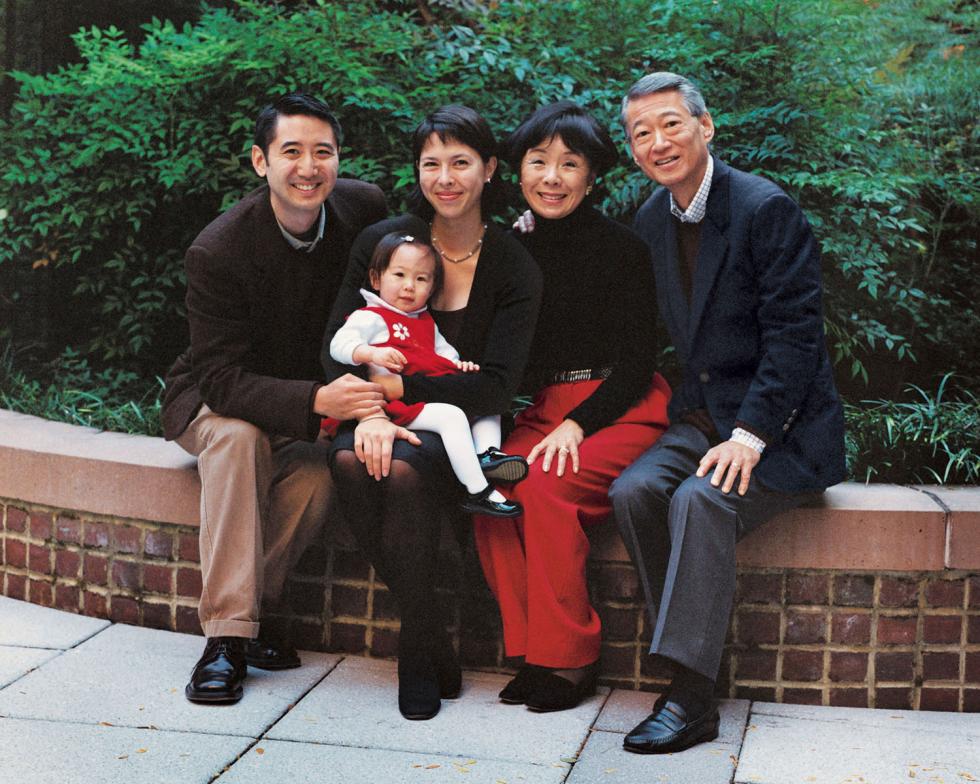When most people think of action heroes, they do so in Hollywood terms: big, brawling, muscle-bound guys for whom compromise is always a dirty word. But in politics, brute force rarely holds sway over the art of the deal. In that regard, Doris Matsui, who represents much of Sacramento in Congress, may just be our very own action star.
Matsui’s style is certainly not the take-no-prisoners variety. If anything, she is unfailingly polite, cheerful and cerebral, maybe even a little wonkish. But, as power brokers in both Washington and Sacramento readily attest, underestimate her at your own risk.
“Based on her work and life experiences, Doris Matsui is the best prepared congressional representative we could ever ask for,” says Barbara O’Connor, a communications professor and political analyst at Sacramento State. “She has very strong bi-partisan support, works well with everyone on both sides of the aisle and just knows how to get things done. She is, frankly, the biggest reason Sacramento received so much funding in the stimulus package.”
That last bit could be open to debate. The rest of the state’s congressional contingent also deserves credit for securing the estimated $85 billion California will garner from President Obama’s American Recovery and Reinvestment Act. There is little doubt, however, that Matsui knows a bit about the time-honored Washington tradition of bringing home the bacon.
Since being elected in March 2005, Matsui has consistently steered federal dollars to the Capital Region, much of it for flood control. She has been a key player in acquiring approximately $700 million for local flood projects, including nearly $60 million in the most recent federal Omnibus Appropriations Act in February. That bill also featured $950,000 for another major infrastructure project Matsui has championed, the city’s efforts to relocate the existing tracks at the Amtrak depot, a key to transforming the railyards into an intermodal transportation facility. Those figures are on top of the roughly $100 million in federal stimulus heading to the Sacramento Region to address a broad spectrum of issues, including transportation, energy, education and public safety.
“Based on her work and life experiences, Doris Matsui is the best prepared congressional representative we could ever ask for.”
Barbara O’Connor communications professor and political analyst, Sacramento State
With so much money flying around these days, gathering federal bucks might seem like an easy task for a member of Congress. But as former Congressman Doug Ose notes, that perception would be very wrong. “Getting that money takes seniority, persistence, hard work, being on good committees, positive relationships — it takes it all. It is a full-time job,” says Ose, who represented California’s 3rd Congressional District from 1999 to 2005.
Only time will resolve the seniority issue, but Matsui has mastered the others in spades. She is a member of two of the most powerful committees in Congress: the House Rules Committee, which determines every bill that goes to the House Floor, and the Energy and Commerce Committee, which has jurisdiction over, among other things, energy policy, consumer affairs and health care matters. She also sits on a trio of subcommittees, ensuring her plate is always full.
“It’s unusual to have two exclusive committees because you’re only supposed to serve on one,” she says, noting that she originally planned to surrender her Rules Committee post after the November 2008 elections. But with all of the chaos that accompanies a change in administration, including the ascension of a new Rules Committee chairman, she says House Speaker Nancy Pelosi asked her to stay. “The Speaker came to me and said, ‘Will you do this?’ I said, ‘If it’s OK with you, it’s OK with me.’” Those seats give her a hand in just about every bit of legislation that goes through the House. While an unusual move, Pelosi didn’t make the pitch in a vacuum.
“I specifically asked for her when I became ranking member,” says Rep. Louise Slaughter, the 12-term Democrat from New York who took over the Rules Committee last year. “Doris is just so valuable to us. She is one of the brightest people I know, and a total workhorse.”
The work ethic is irrefutable. Matsui has a finger in just about every pie in the Sacramento Region: green energy projects, advanced medical technology, transportation, education and flood control. The list goes on. Although the bulk of the money she garnered in the omnibus bill went to flood control, she also acquired funding for an additional 16 projects, ranging from green energy training for the Los Rios Community College District to an extension of light-rail in South Sacramento. If it ever gets overwhelming, nobody has seen the signs.
“Doris believes in action,” says Bill Slaton, the District 7 director for the Sacramento Municipal Utility District. “She believes that, like the Obama administration, we can do more than one thing at a time.”
Slaughter points out that, unlike some similarly driven people, Matsui also manages to do so without making enemies along the way. “Doris is very tough and determined, but she is also unfailingly gracious to everybody,” Slaughter says.
Matsui has needed every bit of that grit and grace. She never expected to be in this position in the first place, and may not have been if not for the unexpected passing of her husband, Bob, who had become an icon in the region. Starting in 1978, Bob Matsui was elected to 14 terms in Congress, forging a reputation as one of the most pragmatic and effective members in the House. But a rare blood disorder took his life on Jan. 1, 2005, leaving her with a major decision.
“Everyone knew she was Bob’s alter ego,” O’Connor says. “She was a real partner who was there with him and really knew and understood what was going on. She was the obvious choice to take over for him when he died.”
That didn’t make the decision any easier, however. “When Bob passed away, I did not want to think about what I was going to do next,” Matsui says. “Most people left me alone for a day or so, but then people kept saying to me, ‘You really ought to think about running for Bob’s position,’ which I just dismissed. I said, ‘I can’t even think about it; give me a month.’ They said, ‘You don’t have a month — two weeks.’” Still deep in mourning, she made the call to forge ahead. The race was not close, and she was sworn in barely two months later.
It didn’t take long for Matsui to get up to speed. “I knew when I first got there that my relationships were there and which people were allies and not,” she says. “I knew that. But you really do have to do it on your own. Quite frankly through that first year in particular, I remember thinking, ‘What would Bob do in this case?’ By the end of that year, I stopped myself and said, ‘I’m not doing that anymore.’ That’s really when I realized it was my seat, and I had to do it my way.”
Slaughter, who originally hails from Kentucky, says that chain of events and how Matsui has handled herself since has more than proven her mettle to her colleagues. “Doris is what down South we call a ‘steel magnolia,’” Slaughter says.
Matsui quickly started proving herself on the local level as well. In June 2005, the U.S. Army Corps of Engineers announced that impending construction on the federally approved Folsom Dam Joint Federal Project, an $848 million spillway designed to give much of Sacramento 200-year flood protection, was being called off over design and cost conflicts. The Bureau of Reclamation, meanwhile, had also determined that the dam needed, among other things, new seismic retrofitting. That left two very powerful federal agencies that had historically not played well together starting over from scratch. When considering the additional needs and wants of state and local flood officials, things did not bode well for the project’s success.
With everything teetering on disaster, Sacramento Area Flood Control Agency Executive Director Stein Buer says what actually did happen next was “so remarkable it almost makes your head spin.” Seizing on a compromise solution that would give everyone what they wanted — more flood control, better earthquake mitigation and acceptable costs — Matsui worked tirelessly to get all sides on board. She followed up by authoring legislation in early 2006 that directed the Corps and the Bureau to collaborate on the spillway project, something Buer says made it clear to both agencies that Congress expected them to work together and get the project done.
“People are naturally drawn to ethical leadership, and that is her strong suit.”
Stein Buer, executive director, Sacramento Area Flood Control Agency
“That told everyone that nobody was going to be able to throw up their hands and walk away,” Buer says, noting that she also stayed on the task, persistently cajoling and handholding all the involved parties to make sure nobody strayed off course. “We went from a disastrous situation to a cooperative and supported project that broke ground last year. It may be the most remarkable achievement in Sacramento flood control history.”
Buer credits all of the parties for the deal, but is adamant that “it absolutely couldn’t have succeeded without Doris Matsui’s involvement.” State Assemblyman Dave Jones, who was privy to the whole process, is equally frank, noting that, “If they did things in the sequential order they usually do, we’d still just be talking about it.” For her part, Matsui says, “You can never have anything stop in federal government because it is very difficult to restart it again.”
It is a process Matsui has applied to numerous other Sacramento-area projects, from the recently completed Folsom bridge to the ongoing railyards renovation. Buer says her methods work in great part because people know they can trust her. “Doris practices what I call principle-centered leadership,” Buer says. “People are naturally drawn to ethical leadership, and that is her strong suit.”
Whether that is enough to accomplish all of her goals is yet to be seen. Ose remains skeptical and notes the best way for the region to get the most from Congress is for representatives to work as a team with each member focusing on specific areas of interest. Ose says the political demise of former Republican Rep. John Doolittle may ultimately cut deeper than anyone expects.
“When John Doolittle was there, you could count on him getting the major appropriations with Doris focusing on flood control and Dan Lungren working on judiciary needs,” Ose says. “Hopefully Doris and others will be able to work out any differences and continue the tradition that Doolittle established to bring that money home to Sacramento. All I can say is, we’ll see.”
Ose also isn’t convinced that having Californians like Pelosi, Rep. Henry Waxman and Sens. Dianne Feinstein and Barbara Boxer at the peak of their political power is any guarantee to benefit the Sacramento Region. “Outside of the Speaker of the House, no member of Congress can be on every committee,” Ose says.
Sacramento Metro Chamber of Commerce President Matt Mahood is also a bit circumspect, noting that the bulk of those leaders are not known for being business-friendly. “Doris Matsui has been a great champion for the Sacramento Region in ensuring that we get our fair share of federal funding for things like flood control. But we really need to have people in power who understand what it is like to write a paycheck and to run a business,” he says.
Mahood is encouraged, however, by Matsui’s ability to work with everyone, adding that “partisan politics simply has to go away” for California’s economy to fully rebound.
Although the nation’s economic woes have hit the Sacramento Region hard, Matsui is decidedly upbeat about the area’s potential. “Sacramento is the [nation’s] laboratory,” she says, noting that many of the region’s major issues — energy, environment, health care and transportation, to name just a few — are also areas of major concern and focus in the halls of Congress.
“You look at everything we’re doing in Congress, and we’re also doing it in Sacramento,” Matsui says. “There is synergy that we can have here. If we do this right over the next four to eight years, we’re going to make great progress. Sacramento is just primed.”
Recommended For You

Streetcar Named Desire
Funding questions loom over downtown streetcar project
For nearly two decades, local city officials have envisioned a streetcar that would transport residents and visitors across downtown Sacramento.

Levee Over Troubled Waters
Paying for repairs just got harder
It’s a calm, clear day on West Sacramento’s South River Road, a meandering two-lane route that runs atop a levee buffering houses and farmland from the placid Sacramento River. It’s hard to envision the chaos that would ensue if the great dirt barrier were to burst, pouring millions of gallons of water into adjacent homes and businesses, but that nightmare scenario just got harder to prevent.




